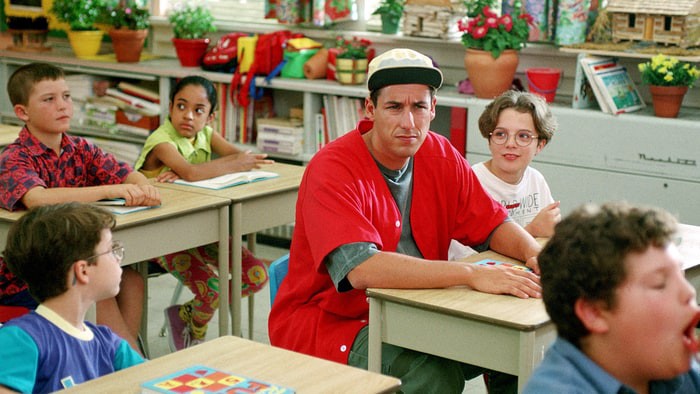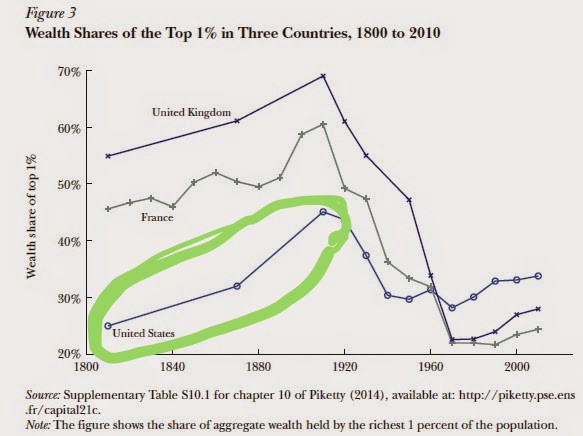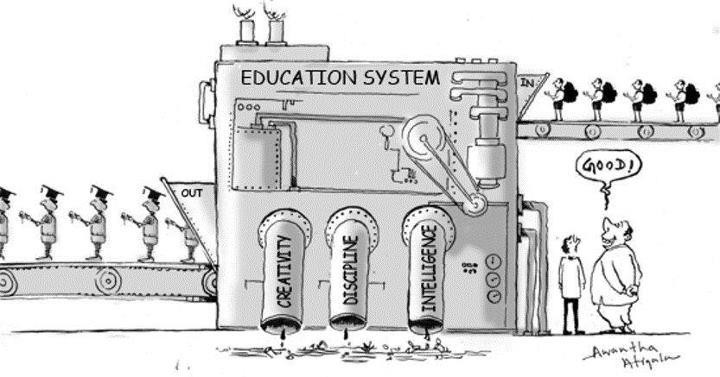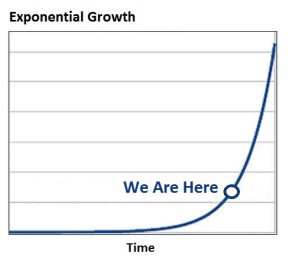Read this if you agree with the following statement: It?s getting harder and harder to make a living .
Many of us are having trouble competing in the knowledge economy, which itself is constantly evolving. This sucks. We are having trouble finding good jobs, and the good jobs that do exist are in danger of disappearing. No job is safe. Unless you?re in tech, of course.
These blanket statements don?t capture much of the emotional struggle we feel. The 21st century economy is an abstract concept. We tend to experience it is this vague, never-ending feeling that things aren?t working that well.
Something is going to give. We just don?t know what, where, or when.
Let me offer an idea to help you orient yourself in this digital world. It?s not new, but it is increasingly relevant. Certainly it?s worth five minutes of your time to consider the implications for your own career, and overall life.
Here?s the idea: the shifting demands of the economy threaten us all for one big scary reason. The habits we pick up in school no longer create economic value. In fact, we may actually be learning to destroy value!
 http://www.rollingstone.com/movies/features/american-idiot-why-billy-madison-is-still-adam-sandlers-best-movie-20150421
http://www.rollingstone.com/movies/features/american-idiot-why-billy-madison-is-still-adam-sandlers-best-movie-20150421
This line of reasoning was prompted by a chapter in The Skeptic?s Guide to American History. I heard something remarkable that the author dropped in almost casually. He mentioned that the modern American school system was primarily designed to instill discipline, not to foster learning. Education was more about forming behavioral habits to enforce mental habits, not vice versa.
Let that settle in for a moment. Education isn?t really about learning! More specifically, it isn?t about learning how to learn. It?s about learning how to conform. Predictability is the ultimate goal.
This idea should scare you. And even if it is only partially true, the idea explains a lot. We are struggling in the 21st century because conformity is no longer that valuable to companies. Software and hardware increasingly shoulder those burdens. Now the economy wants something else. Something unique, and creative. Something our education didn?t cover.
Our school system has somehow flipped from a success story to an impending catastrophe. And this isn?t the first time it?s happened.
Meet the Man(n)
Horace Mann, credited with creating the foundation of our modern public education system, saw that the industrializing world demanded different skills than its agricultural predecessor. This was especially true in the United States, where we (at least try to) democratize economic opportunity and political representation.
 https://en.wikipedia.org/wiki/Horace_Mann
https://en.wikipedia.org/wiki/Horace_Mann
The logic went something like this: If you could compete, you would be hired for a job. If you were hired, your virtuous habits would eventually lead to your promotion. As promotions accumulate, your pay increases and eventually you reach financial comfort. Or perhaps even significant wealth!
Mann wanted every man ? I?m not sure about women ? to be able to compete in the economy. The fragmented local options weren?t able to keep up with the shift in useful skills. A more coordinated effort was required. If nothing happened, the United States would be rocked by social unrest as the classes drifted apart into haves and have-nots.
Sound familiar?
 https://conversableeconomist.blogspot.com/2015/02/piketty-and-wealth-inequality.html
https://conversableeconomist.blogspot.com/2015/02/piketty-and-wealth-inequality.html
The chart above shows how unequal the wealth distribution was getting in the early 19th century. Something needed to be done, and many saw education as the solution. In Mann?s words:
Education then, beyond all other devices of human origin, is the great equalizer of the conditions of men, the balance-wheel of the social machinery.
Old School
Let?s get some context. At the time, formal education was exclusively a local affair. Many children received only a few years of schooling. Others received none at all. The literacy rate is generally thought to be higher than any other country at the time, but it was still way below the current 99%.
The situation varied wildly across the America. Educational attainment and literacy rates were lower in the South vs the North (everything else being equal), and in blacks vs whites (same qualification).
Schoolhouses and teachers were already prevalent ? compared to Europe ? in the colonies, and expanded in America?s early years. This expansion gained steam in the early 19th century, even though the U.S. was growing in size, both territory and population. This explosion of education was mostly due to the efforts of Mann and his colleagues.
Mann saw education as an opportunity to form unbreakable habits:
Habit is a cable; we weave a thread of it each day, and at last we cannot break it.
Mann also knew the value of punctuality in the new, clockwork world of machines and mills; of steam and coal:
Unfaithfulness in the keeping of an appointment is an act of clear dishonesty. You may as well borrow a person?s money as his time.
The school system he helped create reflected his beliefs. He had to prioritize certain aspects over others. For example, lumping students into groups rather than treating them as individuals. This made ?education? much easier, even if it did nothing for the individual student who didn?t adapt well to this new cookie-cutter system.
 http://www.radnor-sevenoaks.org/school-of-life-or-exam-factory/
http://www.radnor-sevenoaks.org/school-of-life-or-exam-factory/
These tradeoffs were necessary to transform an agricultural society into an industrial powerhouse. He was more concerned with illiterate kids showing up late ? if ever? than how to create an adaptable system.
In other words, Mann was a founder. He sacrificed the perfect at the altar of the good.
Job Factories
It?s worth reminding ourselves now about the key characteristics of the industrial era, and how we can see them manifested in the education system that continues to operate across America to this day:
– Schools focus on respecting authority- Schools focus on punctuality- Schools focus on measurement- Schools focus on basic literacy- Schools focus on basic arithmetic
Notice how these reinforce each other. You enter the system one way, and are crammed through an extended molding process. The result? A ?good enough? cog to jam into an industrial machine.
 http://blogs.bgsu.edu/cacnews/2011/12/19/education-history-featured-in-december-archival-chronicle/
http://blogs.bgsu.edu/cacnews/2011/12/19/education-history-featured-in-december-archival-chronicle/
Dependable. Interchangeable. Replaceable.
From Steam to Solar
You and I do not live in the world of Horace Mann. In fact, you and I do not even live in the world of our grandparents. An argument could be made that the 150-year period from the 1830s to 1980s was static in one important way: the value of the ?good enough? mindset.
 https://www.dnainvestor.com/about-us/
https://www.dnainvestor.com/about-us/
Now things are different. Not because something new is happening, but because the same things are happening way faster. The transition from agricultural to industrial took over one hundred years. But we don?t have the luxury of 5+ generations. We are staggering under the the accelerating trends of technological innovational, financial sophistication, political disintegration, and social tribalism.
We know that more is possible than ever before. But that?s only an abstract benefit of today?s world. Many of us have no confidence in our ability to successfully pursue success, however we choose to define it.
Why not? Partially because Mann?s system is now backfiring. We are being molded by the same industrial system that has existed for close to 200 years. But today, that system delivers us into a digital economy that has no need of our outdated skills.
If anything, the creativity and enthusiasm of our childhood was more valuable than the ?good enough? robotic output we produce after 12?16 years in the schoolhouse. That?s why I said earlier that the habits we pick up in school may actually be destroying value, not creating it!
How to be Unemployed in the 21st Century
We could blame many of parts of the educational system. Of course, Mann would agree that these are all good critiques in the modern world. Remember that compared to what it replaced in the early to mid 19th century, this system was pretty f*cking sweet.
In any case, we need to unlearn lots of habits. Here are the top five that I?ve found to be unproductive ? even counterproductive ? today.
#1 ? Filling up the day with time-bound activities.A class in school is 45 minutes, or 60 minutes, or whatever. Have you ever noticed that meetings are often about the same? That?s weird, isn?t it? Who would have thought that so much of the work we need to do fits neatly into easily trackable chunks of time.
It doesn?t, of course. But we carry over this mindset from school. It?s easy to plan classes for a certain block of time at a regular interval. So we do. It?s also easy to plan meetings the same way. Few of us take the time to think carefully about the objectives of a meeting ? exchanging information; discussing a topic; making a decision ? and then focus ruthlessly on achieving them.
#2 ? Accepting whatever you?re assigned. Homework is easy to assign. Teachers hand it out like candy. And your homework looks the same as it did for the person who sat in that chair before you. The teacher can basically check out when it comes to assessing performance. The real world, on the other hand, changes constantly. We can?t just accept our ?homework? like a hamster taking a food pellet.
 http://thehamsterplace.com/hamster-food/
http://thehamsterplace.com/hamster-food/
We have to be comfortable asking questions about assignments that go beyond ?When is this due?? Instead we have to understand the intent behind the project, and its relative importance considered against other projects competing for the same resources.
This type of ?pre-work? requires a lot of tact and humility, of course, but the rewards are worth it. You, your team, and your organization will perform at a much higher level. Most importantly, you will develop confidence in your ability to deliver. It?s hard to take that away from someone once they earn it.
#3 ? Completing projects at the last minute.Almost everyone developed this terrible habit at school. Not only do we accept the assignment as gospel, we also avoid working on it until we?re forced to scramble around and crap out low-quality work hours before the deadline.
The modern economy rewards iteration as a means to quality. The low costs of collaboration and revision means that we need to emphasize getting early feedback, whether it?s from a boss or a user. That means completing a good first draft with at 25% of the timeline remaining, if not significantly more. I try to have a version 1.0 ready before the halfway point.
#4 ? Obsessing over quantified scores and ranks.Why is an ?A? good? Who ever thought it made sense to reduce someone?s creative exploits to a number between 0 and 100? And then to reduce that number to one of five letters? This seems almost offensive until you recognize the needs of the teacher, the school, and the larger system to track and compare students.
The practical effect of this obsession is constant competition. We become zero-sum people. Did I do well? Hard to say: I have to check out my peers first! This is a corrosive mindset, which reaches an insane peak in the military. After spending 6 years in the Marine Corps, I can tell you that rank quickly eats away at your motivation and enthusiasm.
 http://keywordsuggest.org/539475-marine-ranks.html
http://keywordsuggest.org/539475-marine-ranks.html
Focusing on your standing within a group is a terrible way to work in the 21st century. Comparison is the sworn enemy of creativity. You will never be able to create unique value if you can?t avoid comparing yourself to others. Be inspired by the greats, of course. But don?t be yoked to them.
#5 ? Sitting still for 8+ hours a day.I?m not sure what else to say about this. I don?t subscribe to the ?sitting is the new smoking? argument, but it?s undeniable that being a desk jockey is a terrible way to work. Because our exploratory instincts atrophy slowly during school, we slowly come to tolerate sitting quietly in cubicles. This is a tragedy.
Many of us don?t have a lot of control over our workplace or schedule. Focus on doing your best to keep your body moving as much as possible. Stand against a wall during meetings. Take a conference call on your phone while walking around the office or outside.
The Next Step
Doctors are often taught a modern summary of the ancient greek Hippocratic Oath:
First, do no harm
This is a good way to start replacing your industrial habits with ones more appropriate to the digital economy. You do not need to focus so much on becoming amazing at some set of skills. To get started, think about the habits you have that are actually destroying value. Then ? this sounds crazy ? try to replace that bad habit with a neutral one.
You don?t even shoot for a good habit at the beginning. Just stop shooting yourself in the foot repeatedly every day. Life will start to get better a little bit at a time without any massive effort on your part.
Here are five places to target:
- Replace time-bound activities with outcome-based activities. Focus on meetings ? the worst culprit ? and the decisions you want out of them. If you can?t think of a decision, don?t have the meeting.
- Summarize the goals of a new project to the person who asked for it, making sure you know exactly what is supposed to be accomplished, and why.
- Plan to complete a v1.0 of each project by the 50% mark. This is a chance to get valuable corrective feedback from other people, despite how uneasy you may feel with your ?ugly? project.
- Focus on the ?Why?? of each project and knocking it out of the park. Take time at the beginning of the project to get inspired by the work of others, then shut out the rest of the world.
- Get off your ass.

